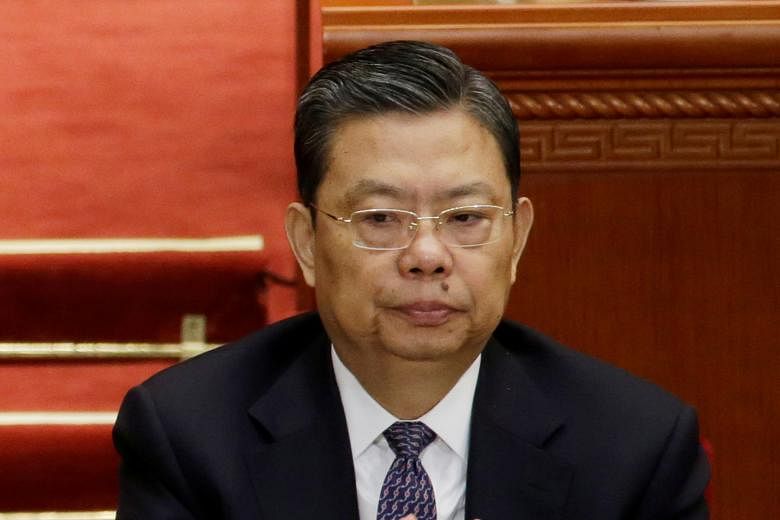Chinese Communist Party organisation chief Zhao Leji looks set to succeed Mr Wang Qishan as China's anti-corruption czar, taking his place on the apex Politburo Standing Committee (PSC).
Mr Zhao, 60, was named a member of the Central Commission for Discipline Inspection, while Mr Wang, 69, was not on the list of 133 new members announced at the close of the 19th national congress yesterday.
Mr Wang's name was also absent from the new Central Committee, indicating his retirement from the PSC. This will be confirmed after the party's new Central Committee picks its top leaders at the first plenum meeting this morning.
Mr Zhao, a close ally of President Xi Jinping, was elevated to the Politburo at the previous party congress in 2012, along with his appointment to head the party's powerful Organisation Department.
As the party's top personnel chief, he oversaw decisions for thousands of senior jobs in the party, government, military, state-owned enterprises and other key bodies.
"Zhao Leji has helped promote many of Xi Jinping's proteges and like-minded officials to important posts," Chinese elite politics expert Li Cheng wrote in a recent paper.
Mr Zhao also visited Singapore in May this year. He co-chaired the sixth Singapore-China Forum on Leadership with Deputy Prime Minister Teo Chee Hean and also met Prime Minister Lee Hsien Loong.
In his new role, Mr Zhao will have to see through the anti-graft drive in a series of "intensified efforts to address corruption that occurs on the people's doorsteps", in line with Mr Xi's key speech at the congress.
These will include setting up a system of disciplinary inspection for city-and county-level party committees, passing a national anti-corruption law and creating a corruption reporting platform that covers both disciplinary inspection commissions and supervision agencies.
Born in Xining, the capital city of north-western Qinghai province in 1957, Mr Zhao joined the Chinese Communist Party in 1975.
For more than a decade, Mr Zhao, who studied philosophy at Peking University, has been seen as a rising star in provincial leadership. In 2000, he became Qinghai governor at the age of 42, making him the youngest governor in the country at the time. His promotion to Qinghai party boss three years later made him the country's youngest provincial party secretary, at age 45.
Mr Zhao, whose ancestral home is in Shaanxi and whose last provincial-level job was that of Shaanxi party boss from 2007 to 2012, is a key figure in the loosely knit Shaanxi gang seen to be in Mr Xi's inner circle. The gang comprises senior party cadres with connections to the north-western province.
During the Cultural Revolution, Mr Zhao was among millions of youth sent to the countryside to be remoulded by hard labour.
"Based on his previous work experience, Zhao is well positioned on the policy front to carry out several of Xi's longstanding objectives: The alleviation of poverty and the strict enforcement of regulations on party officials," wrote Dr Li of the Brookings Institution think-tank.

